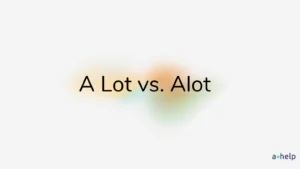The words “who” and “whom” are often confused because they sound similar, but they have different roles in a sentence. “Who” is used as a subject pronoun (it is used for the person performing the action in a sentence) and “whom” is used as an object pronoun (it is used for the person receiving the action).

✅ AI Essay Writer ✅ AI Detector ✅ Plagchecker ✅ Paraphraser
✅ Summarizer ✅ Citation Generator
For example, in the sentence “Who is going to the store?” “who” is the subject doing the action of going, so we put “who.” And, in the sentence “Whom did you see at the store?” “whom” is the object receiving the action of seeing, so we put “whom” there.
The confusion between “who” and “whom” often comes up because in everyday spoken English, many people use “who” in place of “whom.” It can be easily resolved by a punctuation and grammar checker in writing though. Also, some tend to put “whom” wherever they think fits since for some it tends to sound more respectful and professional. However, in formal writing or in situations where correct grammar is important, you need to use “who” and “whom” correctly, as to not confuse the readers or listeners.
When to Use Who and Whom
“Who” is used as a subject pronoun in a sentence, which means it refers to the person doing the action.
So, if you want to say someone is doing something, you should use that word. Here are five examples of sentences, so that you can see it in practice:
- “Who made this delicious cake?” (The cake was made by somebody.)
- “Do you know who is coming to the party?” (Somebody is coming to the party.)
- “The teacher, who has been teaching for 20 years, is retiring.” (The teacher was the one teaching.)
- “Who can answer this question correctly?” (Somebody needs to answer the question.)
- “She is the one who always helps others.” (She always helps others.)
“Whom” is used as an object pronoun, which means it refers to the person receiving the action in a sentence.
Let’s look at the next five examples of sentences using “whom” properly. You can see that you can reformulate the structure of such sentences and get a hint on which word to use:
- “To whom should I address this letter?” (Who is going to receive this letter?)
- “The man whom you met yesterday is my uncle.” (Who did you meet?)
- “Whom did they invite to the wedding?” (Who was invited to the wedding?)
- “She is looking for someone with whom she can practice speaking French.” (Who can she practice French with?)
- “The award was given to the student whom the teachers considered the most improved.” (Who was considered the best by teachers?)
Who vs Whom: How to Figure Out Which to Pick
To decide whether to use “who” or “whom,” you can follow a simple rule: if you can replace the word with “he” or “she,” use “who.” If you can replace it with “him” or “her,” use “whom.”
Here’s an example. In the sentence “___ is going to the store?“, you should try and replace the blank with “he” or “she“, so we get “He is going to the store.” Thus, we should put the word “who” in the sentence. Correct choice is: “Who is going to the store?“
Another case is “To ___ should I give this book?“. After trying the same rule, we replace the blank with “him” or “her“, so “I should give this book to him.” And it is clear that the result should be: “To whom should I give this book?“
Try to complete these sentences by yourself.
- “___ do you think will win the match?”
- “To ___ should I deliver this gift?”
- “I don’t know ___ snuck into the office last night!”
- “Yes, I thought that guy ___ we met on Sunday was pretty cute.”
Remember, “who” is for the subject of a sentence, and “whom” is for the object of a verb or preposition.
FAQ
Follow us on Reddit for more insights and updates.





Comments (0)
Welcome to A*Help comments!
We’re all about debate and discussion at A*Help.
We value the diverse opinions of users, so you may find points of view that you don’t agree with. And that’s cool. However, there are certain things we’re not OK with: attempts to manipulate our data in any way, for example, or the posting of discriminative, offensive, hateful, or disparaging material.